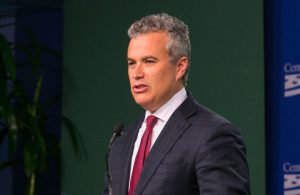
September 9, 2022 – The Treasury Department on Thursday announced an additional $66 million in broadband funding for New Hampshire from the Coronavirus Capital Projects Fund.
This is New Hampshire’s second round of CPF funding, following a $50 million award in June. The state says it will use these funds to bring affordable broadband coverage to over 24,000 homes and businesses.
The funding will go to the state’s Broadband Matching Grant Initiative, a program which subsidizes broadband infrastructure projects undertaken by internet service providers and municipalities. The program aims to provide symmetrical speeds of 100 Mbps up and down.

“Today’s announcement marks a major investment in New Hampshire that will support families, small businesses, and our entire economy,” said Sen. Maggie Hassan, D-N.H. “Expanding access to strong, affordable internet access will help Granite State communities thrive, which is why I led the efforts to secure this funding as part of the American Rescue Plan. I look forward to continue working with my colleagues to boost New Hampshire’s economy.”
Providers that participate in Treasury Department-funded programs are required to enroll in the Federal Communications Commission’s Affordable Connectivity Program, which provides discounts on monthly internet bills and eligible device purchases to low-income households.
Klobuchar pulls antitrust bill following Cruz amendment
Sen. Amy Klobuchar, D-Minnesota, asked on Thursday to postpone a Senate Judiciary Committee vote on a bill that would empower news outlets to collectively bargain for compensation from big tech platforms.
The move came after the committee adoption an anti–content moderation amendment proposed by Sen. Ted Cruz, R-Texas.

Klobuchar’s Journalism Competition and Preservation Act would remove certain antitrust restrictions on news outlets with fewer than 1,500 full-time employers, allowing them to collectively negotiate with large platforms like Facebook and Google.
Cruz’s amendment removes the antitrust exemption if negotiations include content moderation provisions. “What is preeminent to me is whether this bill is going to increase or decrease censorship,” Cruz said.
Klobuchar denounced the amendment as a “get out of jail free card” and said that bipartisan agreement on the bill was “blown up.” Nonetheless, she promised to continue working for a compromise on the bill.
Sen. Jon Ossoff, D-Georgia, was absent from Thursday’s meeting (it was reported that he has COVID-19), allowing Cruz’s provision to pass on a party-line vote of 11-10.
Critics of Klobuchar’s measure say that is anticompetitive and potentially unconstitutional.
Truth Social dealt another blow
The merger between the parent company of Donald Trump’s Truth Social platform and holding company Digital World Acquisition Corp. faced a setback this week.
DWAC lacked the shareholder votes necessary Monday for a 12-month extension to finalize its merger with Truth Social parent company Trump Media and Technology Group, Reuters reported. DWAC convened and rapidly adjourned several shareholder meetings this week without publicizing a vote tally. On Thursday, holding company CEO Patrick Orlando said the vote would be delayed until October 10.
The merger was initially agreed upon last October. If it finalizes, TMTG would become publicly traded and receive a cash influx of $1.25 billion. Saturday, on Truth Social, the former president suggested using personal funds to keep the company private.
The delay is just the latest setback in what’s been a thoroughly fraught process. DWAC is under federal investigation following a Securities and Exchange Commission inquiry into possible misconduct in its dealings with TMTG. Truth Social is reportedly tight on cash and is facing a potential lawsuit from vendor RightForge, claiming unpaid bills of about $1.6 million.
In addition, Truth Social is still unavailable on the Google Play app store, cutting the app off from a potential customer base of roughly 130 million Android smartphone users.
Originally posted on September 9, 2022 @ 5:31 pm



![Read more about the article Where to Watch Twin Peaks in 2022 [All Seasons & Movies]](https://sonicsurfisp.com/wp-content/uploads/2022/10/where-to-watch-twin-peaks-in-2022-all-seasons-movies-300x180.png)